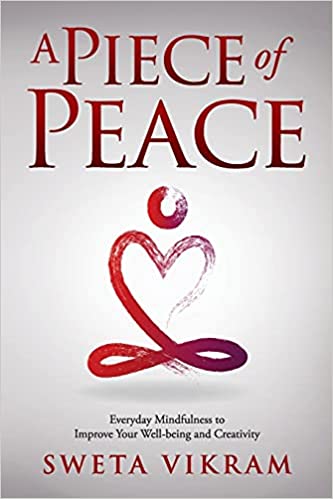BY VEENA RAO
A near-death health crisis motivated New York-based bestselling author Sweta Vikram to write her latest non-fiction work, A Piece of Peace: Everyday Mindfulness You Can Use.
A collection of deeply reflective essays, the book chronicles the author’s six-month-long fight for life, her healing, and her journey back to wellness through Ayurveda, meditation, and mindfulness. The book offers practical plans to live our best lives, with an entire section devoted to thriving during the pandemic.
In this extensive Q&A, Vikram, who is also a mindset and Ayurveda coach, talks about her book, the importance of addressing unresolved trauma, learning to forgive, and breaking stereotypes as a brown immigrant author.
You wrote your collection of essays while recovering from a near-death medical emergency. What motivated you to write a guide for everyday wellbeing?
I feel stories and ideas pick me; I don’t curate them. Once life returned to some level of normalcy after my health crisis, and I started to write again, this book nudged me. I wanted to share my story but mostly help others and hold space for them. Then the pandemic hit, and we all had to endure trauma all over again. I realized that if wellness is at the root of your life principles, no matter what life throws at you, you can handle it. Be it a health crisis or creative block or stress at work or chaos in your personal life. It’s not that you aren’t impacted; it’s just that you are able to stay grounded. When showing up to life, relationships, work, creativity, and your overall wellness becomes part of your daily habit, it shifts your mindset. Staying true to yourself makes you more compassionate with others…I wanted women to remember that self-care is integral to thriving in chaos.
Through A Piece of Peace, I also want to remind women to stop relying on people to build them up or tell their stories. A supportive community is great, but we must each learn to protect our time, peace, creativity, and well-being. Because unexpressed stories, trauma in the body, and lack of self-care can wreak havoc on the body and your life.
You mention in your introduction that a nurse at the surgeon’s office told you she believes chronic illness in women stems from unresolved trauma. Can you talk a little bit about why her words stayed with you? What’s the single biggest lesson you learned during your recovery process?
Often, when people hear the word trauma, they assume it’s in reference to sexual or domestic violence or an accident. If they can’t place their experiences in either of those buckets, they believe that they haven’t experienced trauma. But we forget that trauma is defined as, “A deeply distressing or disturbing experience.” The pandemic has been traumatic for so many of us, no?
As a society, I don’t think we acknowledge or converse about the importance of emotional and mental wellness and the correlation between them. The body gives us signs; stop ignoring them. The reason the nurse’s words stayed with me is because I know we undermine the traumatizing struggles of our daily lives and internalize experiences. It might show up as mental health issues: PTSD, anxiety, depression and more. Physically, unresolved trauma can turn into cardiovascular issues or chronic illness. I have seen unresolved trauma in my clients turn into unmanageable anger issues or emotional eating or temper tantrums. Women, more than men, don’t prioritize themselves. My biggest lesson learned is to never ignore your well-being and that includes your mental, emotional, financial, and physical wellness.
Writing a book is often a journey of discovery for an author. What did you discover as you crafted your reflections that make up A Piece of Peace?
I discovered that my “dharma” or purpose is to raise awareness of holistic wellness, make it accessible to people, and remind folks how our well-being impacts everything. I do this through writing, coaching, and speaking responsibilities. So many assume that holistic medicine and Ayurvedic lifestyle is folk medicine, but it isn’t. There is science and logic behind Ayurveda, mindfulness, yoga, and meditation and the gap needs to be bridged.
I know people who assume they can focus on their career today and worry about their health later. They ignore their sleep, exercise, and diet. Sooner than later, problems creep in. I have lost count of the number of folks who ended up in the ER because of burnout. Honestly, I first-hand know that we are nothing without our health. I want others to start to realize the connection between their well-being and productivity, creativity, and a fulfilled personal life.
You write about the discrimination faced by women writers and why our sisterhood needs to empower each other. For the benefit of our readers, can you talk about the importance and benefits of a strong sisterhood of women writers?
Writing is a solitary profession. The stillness and the isolation make for important ingredients in the recipe of writing. That said, no one can survive and thrive in silos forever. Wanting human connection and engagement is part of our nature and need for survival. But it gets tricky because as writers, we are very vulnerable.
Have you ever told anyone that you are a writer, and they turn around and ask, “But what’s your real job?” Think for a moment. How often are male writers asked this question? Writing, in many people’s eyes, is something of a hobby for women but a profession for men. Also, looking at the publishing industry, it’s hard to not roll your eyes at the skewed statistics and gender bias.
A strong sisterhood of female writers makes the writing journey less lonely. The more of us female writers are successful, the more we raise the demand for our professions. The more of our books get reviewed. The more we can demand for equal pay within the publishing industry. The more we can dissolve stereotypes engulfing women writers. We lift ourselves when we lift others. Having a community feels supportive.
A Piece of Peace also addresses patriarchy, and discrimination based on skin tones and other cultural factors. How have gender bias issues influenced your writing?
Gender bias gets my goat because it is palpable and exists in everything that we do. But it has also made me patient. Some people ask non-PC questions because they are curious, not jerks. It’s taught me to be more discerning about intentions and to not bring my preconceived notions to conversations. It’s also motivated me to explore different cultures and voices and mindsets. Most importantly, it’s trained me to raise awareness of issues crippling our society and berating women through my writing. It’s given me the courage to speak up for those who don’t have the privilege to share their voice.
The essay about breaking stereotypes and sharing more than one story about a culture really spoke to me. How have your choice of stories affected your literary journey?
Wasn’t it Toni Morrison who said, “If there’s a book you really want to read, but it hasn’t been written yet, then you must write it.”? It’s important to tell the stories that only we can tell. I wanted to tell the story about modern, educated, empowered, flawed Indian women working hard to break the shackles of patriarchy, defining their identity, and sipping wine along the way. I wanted to write a story about good Indian men who show up as equals in their partnerships despite not having been brought up with those values. I wanted to highlight life beyond arranged marriages and tyrannical parenting. I desired to showcase how so many women emerge stronger than they could ever imagine. I wanted to emphasize the power of friendship across generations. I read somewhere that stories about our experiences, hopes and fears, helps break down the power of clichés and stereotypes.
I believe staying true to my voice has allowed me to not define myself in a way the western world wants to perceive stories of brown women. It has made me fearless, compassionate, and hungry for the right reasons. My choices of stories have also given me the opportunity to explore topics, people, and cultures that I want to write about versus what I am expected to write because I am an immigrant woman from South Asia.
You talk about learning to forgive at the deepest level. Why is forgiveness important, and how does one forgive?
Most people I know struggle with forgiveness. It’s a human condition. We have all been hurt, and we have all hurt someone. I know that when you care, you have expectations…when there are expectations, there will be hurt. Every person experiences hurt differently.
My suggestion to anyone struggling with forgiving those who have hurt them: We can’t grow unless we let go of what’s holding us back. Forgiveness is the secret ingredient in emotional healing. You forgive others to help yourself. Your life feels lighter, and you don’t carry that heaviness with you. I read somewhere that being angry and hanging on to grudges is equivalent to holding a hot piece of coal in your hands and expecting the person who hurt you to burn. For me, personally, self-reflection and meditation help with forgiveness.
The section titled, ‘Pandemic Survival Kit’ has very useful information about living our best lives during our current uncertain, rough times. In a nutshell, how does one thrive during a pandemic?
I always turn to gratitude when things feel rough. Make a list of five things you are grateful for everyday when you wake up. Sometimes, just being able to breathe is something that I add to my list. It shifts my perspective if I am in a negative headspace. Helping others can feel very uplifting too. Find that one thing that sustains you. For instance, the pandemic reiterated for me that writing centers, heals, and humbles me. It helps me stay dedicated and disciplined and away from the unnecessary & mindless distractions that don’t always add meaning to life.
We all have our own ways to navigate challenging times. Yoga teaches us to show up to life, writing, asanas, and just about everything with dedication but not attachment or ego. That’s my guiding principle. You can’t be all enthusiastic when the internal and external conditions are optimal. I struggled with work-from-home and not being able to see people, especially at the start of the pandemic. But that didn’t mean that I rolled around in my PJs all day. Remote working didn’t change my routine.
Life happens when you are busy planning it. Be okay with things not going as planned. Don’t think of yourself as a victim because the pandemic happened to everyone. The degrees of suffering might differ, but we have all had heartaches. We all have bad days and that’s understandable. Be compassionate towards yourself and others. But after 16 months of navigating life with this virus, we no longer can use “pandemic” as an excuse for not being fully present or trying our best.
Pre-order A Piece of Peace.
Author website: www.swetavikram.com






